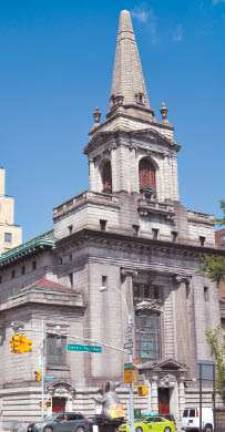Blasphemy and Asbestos

Upper West Side church is the latest to turn condo
Upper West Side A landmarked church on Central Park West and 96th Street is the latest to succumb to a recent trend of religious buildings in prime neighborhoods bought by developers looking to build condos.
The Crenshaw Christian Center at 361 Central Park West was bought earlier this year in a partnership by developers Ira Shapiro and Joseph Brunner, according to The Real Deal website. The pair are reportedly looking to convert the church into condominiums.
Asbestos abatement work is currently being done inside the church, according to neighbors who were told to close their windows. An asbestos abatement notice on the door of the church also indicates work is being done inside by a company called New York Insulation.
Members of Local 78, the asbestos, lead and hazardous waste laborers union, are picketing the work outside the church on the side walk, claiming New York Insulation doesn't pay fair wages and has a long list of violations on its record.
"The problem we have here is the church is like a fortress, we can't see what's going on inside and the doors are locked," said Stephen Benavides, Local 78's Director of Research.
According to the union, New York Insulation has been banned by the state from working on public projects until 2017 for willfully failing to pay workers the standard prevailing wage. The union says the company has also been cited over a hundred times by both the state Dept. of Labor and the city's Dept. of Environmental Protection.
New York Insulation did not return a request for comment.
Elizabeth Perea lives next door to the church on Central Park West, and said the superintendent in her building instructed the doorman to tell residents they should close their windows.
"We're very concerned about asbestos being stirred up into the air," said Perea.
Councilman Mark Levine, in whose district the church is located, said he's concerned that the work isn't being done safely.
"This site has a huge amount of asbestos and they have a contractor in there that has a long history of violations of safety and wage and hour rules, so I'm worried about whether they're taking adequate safety measures," said Levine.
Safety concerns of the union and Levine include whether New York Insulation is swapping out air filters - which are expensive, according to Benavides - used to ventilate the building, and whether workers are being allowed to leave the site with asbestos on their clothing.
Levine is also curious as to how developers plan on converting the church into condos that anyone would want to live in without damaging its historic features.
"To convert it to luxury condos, I don't see how you could do that without violating the historic integrity of that structure. It's hard to imagine a building less suited for condos, primarily because it has no windows and just that one entrance up front," said Levine. "It seems to me to be a stretch and I'm worried that the contractor or developer is cutting corners and one day we're going to wake up and there's going to be irreparable damage to the façade."
Of broader concern to Levine is the trend of religious buildings being bought up and converted into condos by developers.
According to a roundup by the website Curbed NY, 26 houses of worship are being converted into condos citywide, 12 of which are in Manhattan. Curbed's roundup doesn't include this most recent case at 361 Central Park West, nor does it include the controversial plan to build a 428-unit luxury building adjacent to St. John the Divine Cathedral on 113th Street and Amsterdam Avenue.
In addition, said Levine, the Catholic archdiocese is set to announce a round of parish mergers and closures to counteract shrinking congregations and rising maintenance costs of old churches under its ownership.
"There's a whole series of churches which have dwindling congregations but valuable real estate that are tempted to in some way sell to developers," said Levine.
Levine said the trend could threaten treasured landmarks and in some cases could displace congregations that help keep a community close-knit.
"I lament the fact that we have this drive to develop every usable square-inch of space in Manhattan for luxury housing," said Levine. "We have a desperate need for affordable housing. We're short on schools, we're short on open space and parkland."
The website of the Crenshaw Christian Center still features a photo of the church at 361 Central Park West, where they used to congegrate, but a notice on the door of the church says they've since moved their services to an AMC Theater in Times Square.
"There's this drive to convert every square-inch of usable space to luxury housing and I regret that," said Levine. "I wish we had a way to bring more diverse use to these types of facilities."